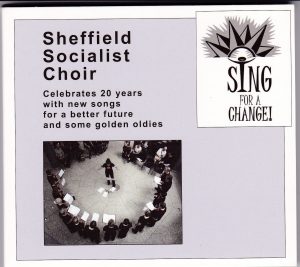Recorded live at our 20th anniversary concert at the Octagon Centre, Sheffield University on 18th May 2008, featuring seven newly commissioned songs and some ‘golden oldies’. Many of the songwriters are interviewed by compère Rony Robinson before each one. Live recording engineer: Keith Angel.
The Internationale Rise up, all victims of oppression! A new, up-beat version, with words by the British singer/songwriter Billy Bragg, set to a tune after Degeyter and arranged by David Bedford and John Abraham in 1991. Copyright: Billy Bragg
We Are All Under the Stars by Ali Burns
Ali says: “I have a fascination with spoken and sung text together and I wanted to create a piece of music that could be versatile. The message is ‘We are the same the world over and we HAVE to share this planet’, but, by changing the spoken text, that message can reflect different political contexts.”
The text read out here is from The Universal Declaration of Human Rights
Bongola by Anita Mahdia Daulne
Mahdia says: “Change comes first from oneself. And, as the centre of our thoughts, our words and our actions is our heart, we have to begin by changing our own heart. Then, gradually, our thoughts, our words and our steps will take on the most beautiful colours of life. And will reflect themselves on others.”
In the Kingwana/Lingala languages of the Congo
How I Long for Peace by Peggy Seeger
Peggy says: “Before a concert in Philadelphia in 2001, while humming ‘Wild Mountain Thyme’, I got the idea for this chorus. I asked the audience to make up verses – an old man handed up Verse 2. I sang it for years like that, then made my own tune and four new verses.”
La Plegària a un Labrador by Victor Jara
(The workers’ prayer) Victor Jara’s plea to Chile’s farm labourers to join with urban workers in taking their tools and lives into their own hands. Jara was a leader in the People’s Song Movement, and was murdered by the military junta which overthrew the Allende government. Arranged by John Abraham of Cor Cochion. Copyright: Essex Music Group.
Senzenina “What have we done? Our crime is being Black”. Sung in the Xhosa language, this is a lament against the Pass Laws in South Africa, under which Black people were forced to carry identity papers at all times. Traditional South Africa
Somewhere on Sea by Theo Simon
Theo says: “This song is an apology to people of the future who are living ‘Somewhere-on-Sea’. The choir presents us with many different voices of denial, excuse and positive spin raised when we contemplate climate change. Finally, they empower themselves to resolve the crisis together, as I hope we shall.”
Sleep by Chumbawamba
Chumba says: “Old age and illness has fused with polite British gentility to see Margaret Thatcher as a harmless old relic. We wrote a song which scorns this idea, which can be beautifully sung, soft and harmonically clear, and yet is scathing in its condemnation of a woman who blighted so many people’s lives. And yes, a song which quietly celebrates the fact that our demons, thankfully, sometimes sleep the soundest of sleeps.”
Crossing the Border by Pete Moser (music) and Lemn Sissay (words)
Pete says: “When I was first thinking of our project ‘The Long Walk’, a response to the Morecambe Bay tragedy of 2004, I saw a quote in Nelson Mandela’s autobiography: ‘After crossing the border I breathed deeply. The air of one’s home always smells sweet after one has been away.’ Lemn took this and other ideas to develop the lyric, which touches on many elements of the emotions and politics of journey and return.”
The Power of Song by Leon Rosselson
Leon says: “For those at the bottom, with nothing much else but their voices (and, it might appear, nothing much to sing about), song has always been important in creating solidarity and empowering them in their struggle for a better life. That’s what my song is about.”
To buy this CD email: CDSales@socialistchoir.org.uk

